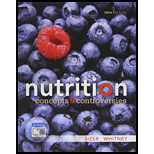
EBK NUTRITION
15th Edition
ISBN: 9780357390672
Author: Sizer
Publisher: CENGAGE CO
expand_more
expand_more
format_list_bulleted
Concept explainers
Question
Chapter 6, Problem 5SC
Summary Introduction
Introduction:
Protein digestion is a process in which human body’s
Expert Solution & Answer
Want to see the full answer?
Check out a sample textbook solution
Knowledge Booster
Learn more about
Need a deep-dive on the concept behind this application? Look no further. Learn more about this topic, health-nutrition and related others by exploring similar questions and additional content below.Similar questions
- List the organs and accessory organs of the digestive system. On a separate piece of paper, list the main functions of each organ.arrow_forwardFigure 34.19 Which of the following statements about digestive processes is true? Amylase, maltaseT and lactase in the mouth digest carbohydrates. Trypsin and lipase in the stomach digest protein. Bile emulsifies lipids in the small intestine. No food is absorbed until the small intestine.arrow_forwardMatch the digestive system parts and functions.arrow_forward
- Figure 34.11 Which of the following statements about the digestive system is false? Chyme is a mixture of food and digestive juices that is produced in the stomach. Food enters the large intestine before the small intestine. In the small intestine, chyme mixes with bile, which emulsifies fats. The stomach is separated from the small intestine by the pylloric sphincter.arrow_forwardThe lack of adequate saliva due to the absence of or diminished secretions by the salivary glands is known as zerostomia. _____________________arrow_forwardDefine peristalsis, and list the regions of the GI tract where it occurs. Be sure to mention segmentation in your answer.arrow_forward
- Different regions of the digestive system specialize in ________ and _________ food and in __________ unabsorbed food residues.arrow_forwardFigure 34.12 Which of the following statements about the small intestine is false? Absorptive cells that line the small intestine have microvilli, small projections that increase surface area and aid in the absorption of food. The inside of the small intestine has many folds, called villi. Microvilli are lined with blood vessels as well as lymphatic vessels. The inside of the small intestine is called the lumen.arrow_forwardWhat are the main functions of the stomach? What roles do enzymes and hormones play?arrow_forward
- Where does the majority of chemical digestion in the stomach occur? fundus and body cardia and fundus body and pyloins bodyarrow_forwardUsing the black lines shown in Figure 11.27, name the types of nutrient molecules present at each site that are small enough to be absorbed across the small intestines lining. Figure 11.27 Fill in the blanks for substances that cross the lining of the small intestine.arrow_forwardWhere does the majority of fat digestion take place? a. mouth b. stomach c. small intestine d. large intestinearrow_forward
arrow_back_ios
SEE MORE QUESTIONS
arrow_forward_ios
Recommended textbooks for you
 Human Biology (MindTap Course List)BiologyISBN:9781305112100Author:Cecie Starr, Beverly McMillanPublisher:Cengage Learning
Human Biology (MindTap Course List)BiologyISBN:9781305112100Author:Cecie Starr, Beverly McMillanPublisher:Cengage Learning Human Physiology: From Cells to Systems (MindTap ...BiologyISBN:9781285866932Author:Lauralee SherwoodPublisher:Cengage Learning
Human Physiology: From Cells to Systems (MindTap ...BiologyISBN:9781285866932Author:Lauralee SherwoodPublisher:Cengage Learning Biology 2eBiologyISBN:9781947172517Author:Matthew Douglas, Jung Choi, Mary Ann ClarkPublisher:OpenStax
Biology 2eBiologyISBN:9781947172517Author:Matthew Douglas, Jung Choi, Mary Ann ClarkPublisher:OpenStax

Human Biology (MindTap Course List)
Biology
ISBN:9781305112100
Author:Cecie Starr, Beverly McMillan
Publisher:Cengage Learning

Human Physiology: From Cells to Systems (MindTap ...
Biology
ISBN:9781285866932
Author:Lauralee Sherwood
Publisher:Cengage Learning



Biology 2e
Biology
ISBN:9781947172517
Author:Matthew Douglas, Jung Choi, Mary Ann Clark
Publisher:OpenStax
